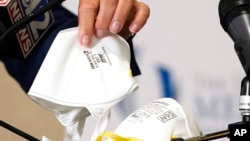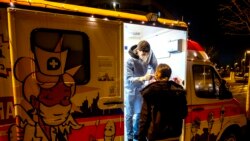U.S. news outlets said Wednesday that the Biden administration will distribute 400 million high-quality face masks free of charge to the American people beginning next week.
A White House official, speaking anonymously, said the N95 masks will be shipped to thousands of local pharmacies and community health centers across the United States beginning later this week, with three masks available per adult. The program will be fully operational by early February.
The N95 masks are part of the 750 million masks housed in the federal government’s Strategic National Stockpile, which stores critical medicines and medical supplies for use during a public health emergency. The U.S. Centers for Disease Control and Prevention recently advised that N95 masks, which are designed to fit tightly on a person’s face, “offer the highest level of protection” against COVID-19, compared to other face masks.
The officials say the distribution of the N95 masks will be the largest deployment of personal protective equipment in U.S. history.
Announcement of the free N95 face masks comes on the same day as the official debut of the federal government’s new website that allows Americans to request free rapid coronavirus test kits. Millions of households began placing orders for the test kits Tuesday during a soft launch of Covidtests.gov. The website allows each household to order a maximum of four tests after clicking on a link that connects to a U.S. Postal Service form.
Some occupants of apartments and other multi-unit dwellings, however, complained on social media that the website’s address verification tool was enforcing the four-per-person household, only allowing one family per building to request the tests.
The two programs are part of an aggressive new effort by the Biden administration to combat a surge of new COVID-19 infections largely driven by the highly contagious omicron variant of the coronavirus.
A high-ranking official with the World Health Organization says the world could turn the corner on the COVID-19 pandemic this year through a more equitable distribution of vaccines and treatments.
Dr. Michael Ryan, the director of WHO’s health emergencies program, told the World Economic Forum Tuesday that COVID-19 may never be eradicated, but stressed the current public health emergency could finally come to an end if more vaccines finally reach the world’s poorest countries.
The U.N. health agency has repeatedly criticized the world’s richest countries for building up huge stockpiles of COVID-19 vaccines and using them to administer booster shots to its citizens, while poorer nations have barely received even a first dose of a vaccine.
More than 334,469,000 people around the globe have been sickened since COVID-19 was first detected in Wuhan, China in late 2019, according to figures compiled by the Johns Hopkins Coronavirus Resource Center. The center reports more than 5.5. million deaths globally.
Germany announced Wednesday that it had recorded 112,323 new COVID-19 cases, the country’s highest-ever daily figure and the first time it had broken the 100,000 mark for a single day. The Robert Koch Institute, Germany’s disease control and prevention agency, said 70 percent of the new cases were driven by the highly-contagious omicron variant. The surge of new infections has prompted the government of new Chancellor Olaf Scholz to consider imposing mandatory vaccinations.
Tokyo and 12 other Japanese prefectures will be placed under new COVID-19 restrictions effective Friday as Japan struggles with an omicron-driven surge. Prime Minister Fumio Kishida told reporters Wednesday in the Japanese capital the new decree will allow local governors to limit the operating hours of bars and restaurants and ban the sale of alcohol. The restrictions will remain in effect until February 13.
Some information for this report came from the Associated Press, Reuters, Agence France-Presse.






